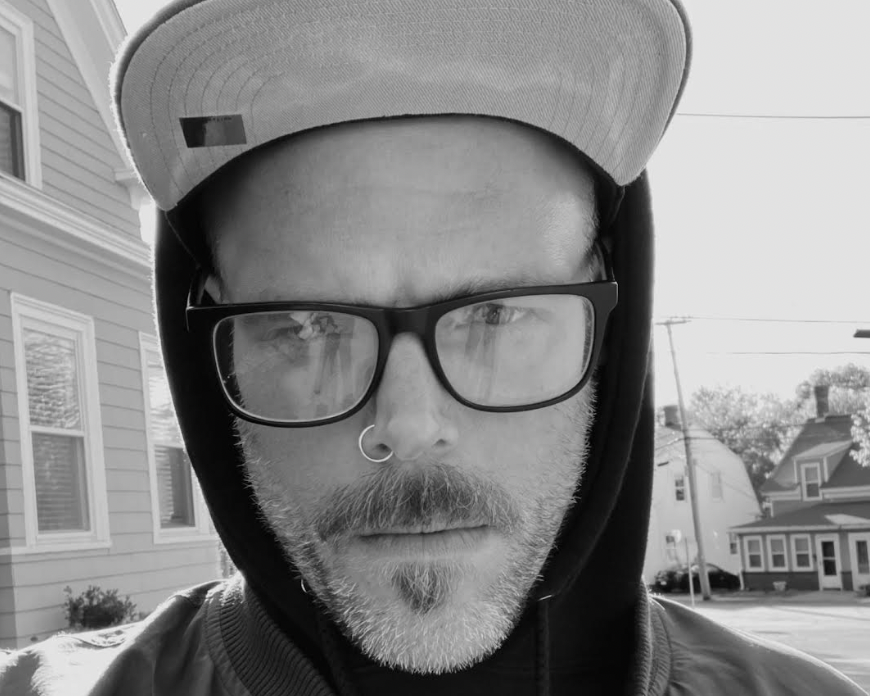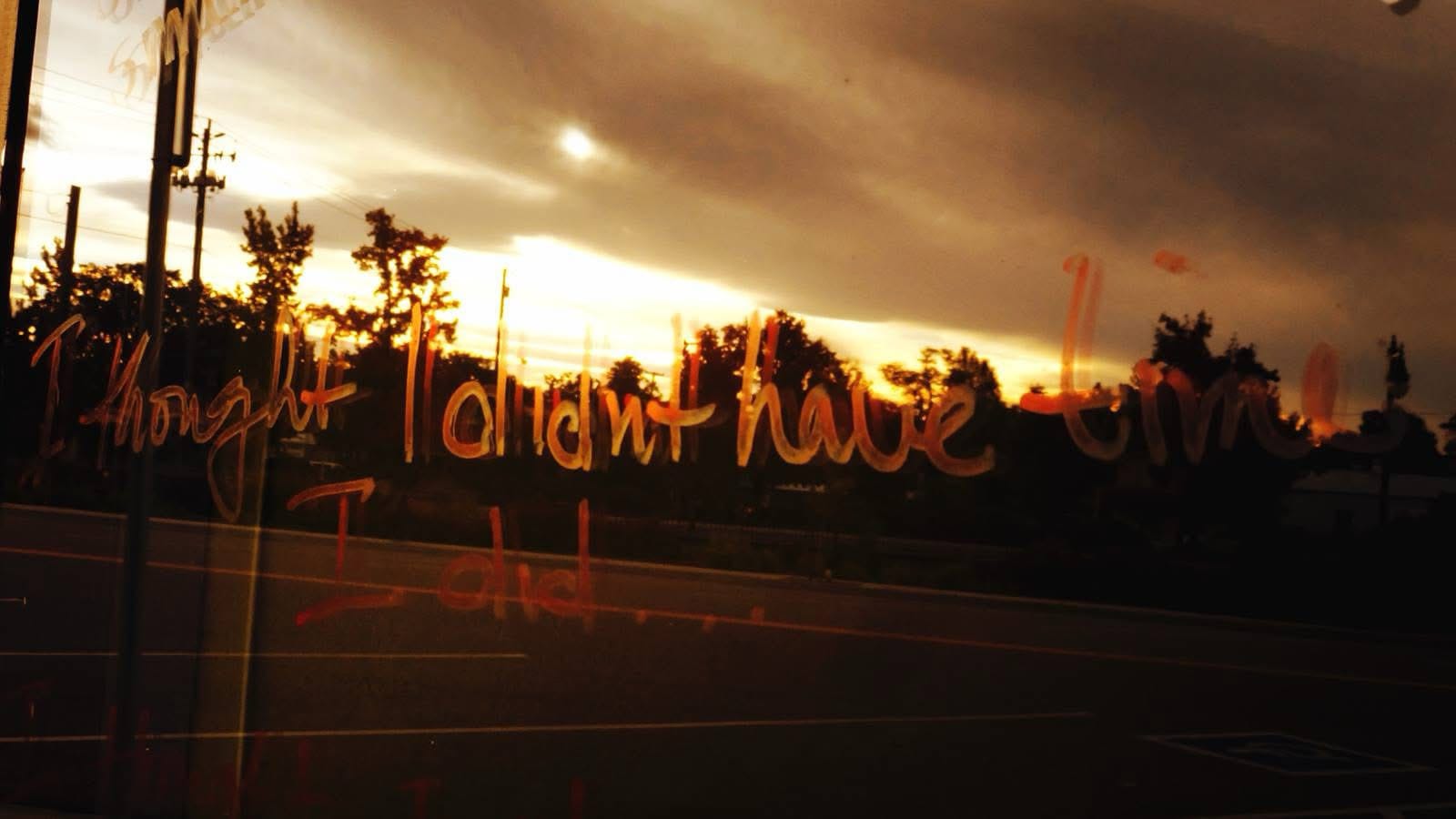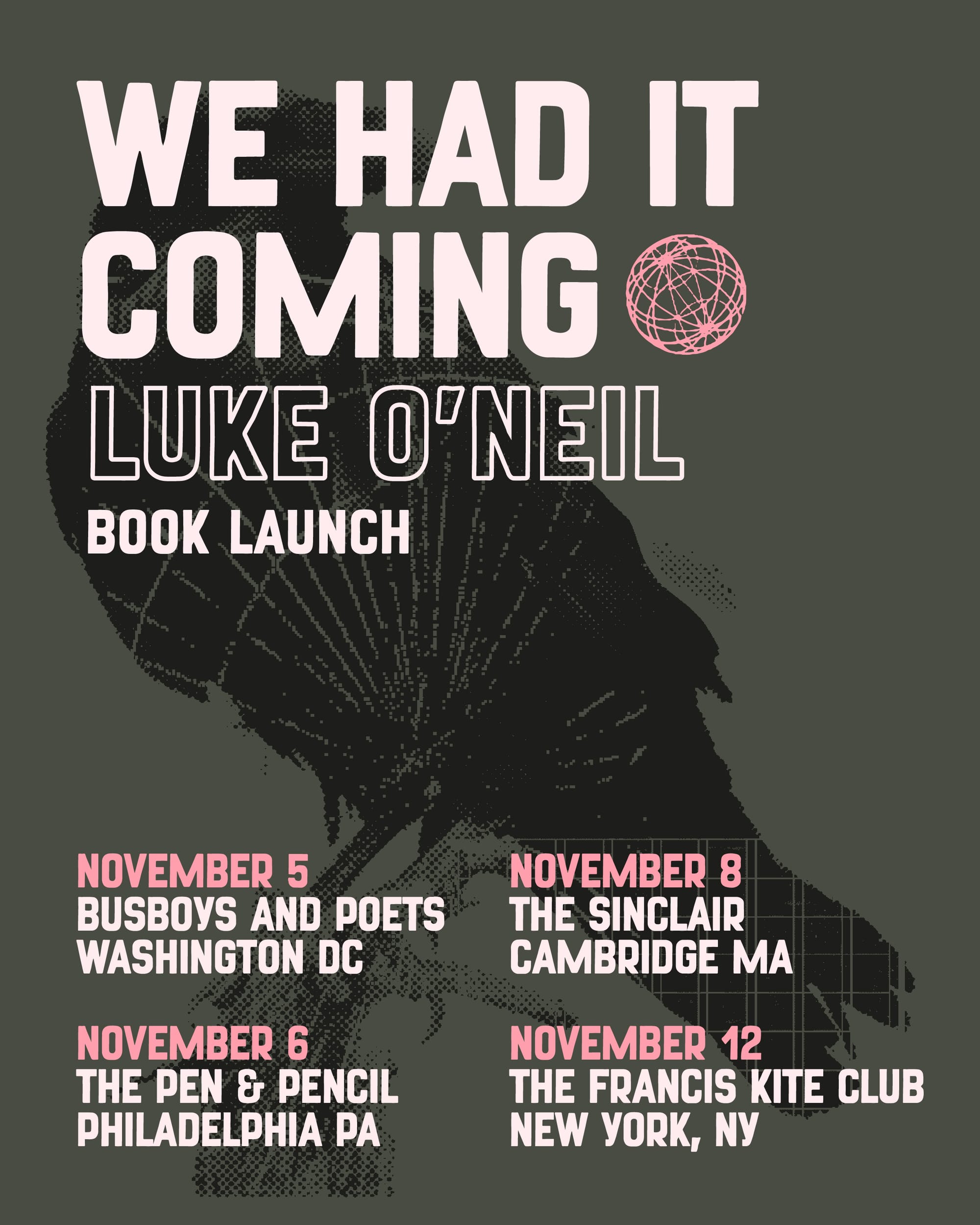Our new friend Luke got in touch with us because he has a new book coming out, We Had it Coming, and because we have a new publication about books, and we have in common being energized to write about our depression and anger at the world as it currently is, but should not be. Despite being extremely East Coast, he had the good sense to have a couple sections in it about California, one of which includes the classic scene, familiar to all, in which an East Coast person comes to the Bay Area and discovers that the marine layer is cold as hell. The book is great, very depressing, and very angry. Luke runs the newsletter Welcome to Hell World, where if you're a subscriber, like us, you can read articles like “Our Survival is Their Failure” about ICE raids in Chicago and New York.
We chatted with him about the California section, “All of us were here for a little while and then we were somewhere else” (which is excerpted here), and also about writing, about writing about California, and about writing about California from Boston without knowing what the hell California even is, but also, sort of, knowing exactly what it is. And also about writing about death. Luke should move to Oakland, which our highest praise. —ORB

So, how much “you” is the speaker here? If that's the right kind of impertinent question, how do you manage the fiction and nonfiction thing? I found an older Hell World post that has the weird Trump ocean poetry quote that appears in “All of us were here for a little while and then we were somewhere else” which is more of a straight-up normal “you” voice, there. But in “All of us…” in the book, it’s integrated into something you could put on a “fiction” shelf in a bookstore, subtitled “and other fictions.”
This book, like the last one, A Creature Wanting Form, is a mix of traditional short stories, prose poems, sort of tweet-length microfiction, and more memoirlike essays, like the one in question here. Some of the pieces are very clearly me, the real person, as the narrator, or more accurately the sort of heightened Luke character that I present as in the Welcome to Hell World newsletter, and regular readers will probably be able to spot which ones those are. Others are made up and more like science fiction or horror pieces, but like any fiction writer I sneak things from my real life or that I’ve observed in the real world in there. This piece about California and all the times I’ve been there and all the times I’ve longed to be there is pretty close to nonfiction, but I tweaked it here and there.
When I started the newsletter seven years ago, it was largely a journalistic concern, and still is for the most part, but the thing that really resonated with people was the sort of elegiac poetrylike way I wrote about the news and inserted myself into stories. “This is one of the good ones,” as the readers would say. I eventually decided to try making books out of those parts alone. Oops, all “good ones!”

I think I might have fucked myself by doing all this, by the way. It’s hard enough to get coverage of a nonfiction book, like my first two, but at least there’s usually a newspeg. Getting anyone to give a shit about poetry and short fiction is a whole other fucking thing.
Well, thank god for the Oakland Review of Books, then!
Many are saying that.
And this was clearly the piece for us to excerpt and talk about because there’s only one other mention of California in the book: “two tall thin arbovitae” that looked like they belonged elsewhere, “California perhaps,” which is also using California as a kind of figure for “somewhere else entirely.” But “All of us…” is very much about how “California,” with the quotes firmly scare-quoted, is this whole other place, that you know on some level is actually a boring normal real place (where life sucks, like other places), but also, mostly, exists for you as the idea of itself, and in some ways maybe more…like America, but obscenely more so? Or something. So let me ask: What does “California” mean for someone that lives firmly not in California?
There’s another story in the book about watching the Super Bowl while scrolling through images of the genocide in Gaza where I write about the NFL and America:
"I was going to say it is our essence distilled but that implies something being made small and more potent which is the opposite of the Super Bowl and America neither of which can be diminished but instead can only expand. … Something so garish defies metaphor. Something so large defies metaphor."
And I think that applies to “California” as well. “The most uncanny state in America. The most uncanny country in creation,” as I call it.
Just going to note that to talk about “California” in quotes, you have to talk about a story that isn’t about California, which feels exactly right.
But California no quotes too. It was the original goal line and endpoint of America’s expansion (besides all the rest of it that came after of course). The bullshit myth of Manifest Destiny. It’s also the base from which we’ve launched our cultural expansion out into the rest of the world. The soft power we are dumping in the shitter now to please Our Single Worst Man. “California” is everything overwrought and disgusting and shiny and broken about this country. Not just the quintessential American state but the most American as well if that makes sense. Both in the way it has long been represented in film and fiction, but also in reality.
This isn’t a novel idea of course. It’s the underpinnings of every single noir ever made. The darkness beneath the façade of glamour and all that. They do that about where I’m from too. “Boston” has been an entire genre of film for decades now, but as someone from here I can more easily see the lie being sold. Having only been to California maybe seven times it’s easier for me to give in to the lie even if I know what’s happening.
It’s a lot easier for me to ignore Boston than it is for you to ignore California, too, and that’s part of its “bigness,” the way the scarequoted version of this place gets everywhere.
What the fuck did you just say to me about Boston? Go Celtics, kid!
Or maybe part of it, too, is that Oakland isn't in "California" either; that “California” feels like a six-hour drive away on the 5. Maybe Angelenos don’t live in that one, either, except insofar as they live in America.
I’ve been to “the Bay” a few times, to Frisco, as I believe you call it?
Don’t get us started on that one.
Also a few surreal days on the Facebook campus for a job interview ten years ago or so, but I’m very sorry to say I’ve never spent much time in Oakland. I have read There There by Tommy Orange, though, so I think that counts? One of the first CDs I ever bought was 93 'til Infinity. I guess that’s like telling a guy from Boston you used to listen to Gang Starr.
The fact that the speaker has “only been to California five or seven or ten times,” is a nice way of getting at that thing where the more you come here, the less you actually feel like you have a handle on the place.
By the way, I mention a lot of the iconic chroniclers of California in the piece, but I’d also be remiss if I didn’t pay homage to my recently departed friend Kaleb Horton, the great California writer. I wrote once that I wanted to do life over as a guy like him who knew all the dives of California instead of the ones of Massachusetts: “I was always jealous of the way he saw California. And not just California but Central California. What even is that? Is that a real place? It always seemed so alien to me as a Massachusetts townie but oddly familiar through his lens.”

I read your very nice remembrance of him, and looking over his photos, which are so luminous, maybe you’re getting at something about how all the other Californias, that aren’t the scare-quoted “California” of myth and icon, but are just some shitty town near Bakersfield or Fresno sort of… seem extra real because of that comparison. But also unreal, too, because they're California, but … not.
Maybe it’s also a grass-is-always-greener feeling. The two coasts in the way they always exist in contract and in chorus with one another. The grass is always drier too. And so easily burned.
That reminds me there’s another story set in California, although I don’t state it explicitly. “The fullest extent of the law,” which is about the aftermath of devastating wildfires. I guess that could take place anywhere, and probably will at some point.
That’s a good one. The line about being “all of out of ideas” once they realize they can’t shoot or arrest the fire definitely captures something. And another one that’s maybe secretly, also, mainly about death? Or maybe not even secretly?
I was describing this excerpt to someone and I used the phrase “death drive,” because it feels like that’s another big part of what “California” comes to feel like, here. The John Fante quote that gives it its title. The person you mourn without knowing details. But then I didn’t know what else to say, and maybe that’s more-comment-than-question because the piece is such poem-y piece of prose, without real resolution or release, just accumulating images and harmonies. A feeling.
I suppose it’s not giving any big secret away that “going to California” is also about a different kind of journey. The ocean is just as cold over there as it is here if you follow me. Even if none of us, as I write, “can agree about what ‘going to California’ even means.” Am I quoting my own story too much? It’s so hard to talk about your own book without coming across as douchey I’m very sorry.
I just realized this is all sort of the inverse of that Augustana song “Boston.” A good song! Cheesy but…nevertheless. Maybe that one was a response to the Phantom Planet song? It was the early 2000s, I don’t know what to tell you.
Anyway the death drive is a big presence throughout the book. We had it coming as a sentiment is, on the top level, about the destruction we as a country have wrought throughout the world, and in particular Gaza, which was thrumming in the background as I wrote most of this. But it’s also about what I, and people like me, individually have coming from our poor choices substance abuse-wise.
I take that back. Other people do not but I do.
Well and the “California” myth is so potent because it's about escape from yourself, from your past, your choices, your shitty country. California is like Texas in that it's so big and sufficient, maybe you don’t have to even be an American anymore. But then you get here, and you’re like “I’m in Bakersfield?” If we’re going to be Freudian like that, the repressed always pops back up, and maybe that’s the Central Californian thing Kaleb Horton was capturing, the so-far-from-God, so-close-to-California feeling that so much of this state is cursed with.
I think that’s exactly right. Out of curiosity who else would you put in that catalog at the top of the piece about the bards of California or whatever? Too Short?
Tommy Orange might be the bard of Oakland, though it feels too early to say that. The first thing I thought when I read that catalog, “Steinbeck or Hammett or Lynch or Chandler or Didion or West or Tarantino,” is man, what a lot of LA, but then coming back to it, Didion’s from Sac, Steinbeck is truly a NorCal guy, Hammett is very San Francisco. Jack London might be part of that group, because even though people associate him with Alaska, that’s the Alaska gold rush types go to once California’s claims are played out. Jack London spent time in Oakland, when he was a socialist, and then he left Oakland when he decided he was done being a socialist.
Maybe I’ll do the opposite. Finally go to Oakland when I’m done being a socialist. Let me just sell one million copies of this book and get back to you.
I want to get back to the story, and the way Trump enters into it, our worst person, and also the only person who could so authentically tell assholes in Las Vegas, “Maybe someday you’ll have the ocean, you never know.” It’s perfect poetry, in like six different ways. Do you think that’s part of his appeal, that even good leftists like us that hope he [redacted]s soon, can’t help but feel, that he offers the peace of death, or something? How do you solve a problem like America—well, what if we made the worst person in the world in charge of it? I mean, he’s literally bulldozing the White House, is this a leftist’s dream?
It is pretty funny that so many people have been like “I’m all in favor of destroying the White House but not like this.”
I felt conflicted about including that Trump quote as a bit of a laugh line, because we’re long past the point of “he’s actually really funny you know” being a fun or cute thing to point out. But it is poetry. He has an undeniable albeit inadvertent facility for changing the language. Maybe not in the way a poet does, where it’s on purpose, but how a child does. I read something Tim Robinson said about how a lot of the halted, sputtering novel diction his characters speak in just comes from him listening to his children talk.
Of course, Trump is also decidedly and superlatively not-Californian, he is, of course, the embodiment of New York City, but he’s also The Most American Man, which sits in conflict with the idea of California being The Most American State.
There’s something to the idea of him offering, as you call it, the peace of death, in the way that any other cultlike or religious figure does. But it’s the vengeful version of that. Live forever by exalting in the death of your enemies. I don’t know. I’m kind of sick of psychologizing this piece of shit.
There is perhaps surprisingly a second piece in the book that mentions Family Feud—we watch a lot of Game Show Network, man—and there’s a line it that basically sums most of where we stand now for me.
"I watched a Family Feud the other night where Steve told one of the teams that they didn’t give him the answers on his card beforehand but he damn well knew what the answers were not."
Buy Luke O'Neil's We Had it Coming from our friends at East Bay Booksellers. And be sure to check out the excerpt, "All of us were here for a little while and then we were somewhere else."


